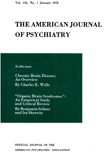CURRENT ATTITUDES TO ALCOHOLISM OF PSYCHIATRISTS IN SOUTHERN CALIFORNIA
Abstract
A questionnaire on alcoholism returned by members of the Southern California Psychiatric Society shows the following:
1. Almost half the respondents do not treat alcoholics. Almost half of those who do limit the number they treat. In approximate numbers, four-fifths treat 5 or fewer, a total of 55 alcoholics. Five-sixths had 10% or less alcoholics in practice.
2. The members show no enthusiasm over their therapeutic results. Over half have no recoveries whatever. Almost four-fifths of those with any success have 10% recovery or less.
3. An overwhelming majority of the respondents use psychological therapies in chronic alcoholism.
4. Three-quarters of the members are in private practice, the rest in hospitals and clinics. Treatment of alcoholics appears to be restricted almost entirely to hospital practice and a small group of private psychiatrists.
5. Almost two-fifths of psychiatrists do not know admission procedures to state hospitals, and three-fifths have never arranged admission. Two-fifths have had their patients refused admission to state hospitals. Over half consider admission procedures unsatisfactory. Over three-fifths approve of legal commitment for alcoholics, and three-fifths feel that treatment is helpful in committed patients.
6. Alcoholics Anonymous is approved by 99% of psychiatrists. Ninety-seven percent know their procedures, and 77% have referred patients to them. The results, however, they feel are only moderately good; that is, two-fifths remain abstinent for 1 year, one-fifth for 2 years, and one-tenth over 2 years. The respondents also feel that only half are well adjusted.
7. About two-fifths of the psychiatrists felt they had adequate facilities for private patients. Facilities for indigent patients are extremely meager. Three-tenths felt they had adequate hospital facilities, but just a handful felt they had adequate clinic or sanitarium facilities. Clinic and hospital facilities are most urgently needed.
8. Eighty-nine percent of psychiatrists are in favor of a clinic for alcoholics, and they feel that state, county, and community should support it.
9. Almost half feel that the Society should sponsor a clinic for alcoholics but both the assenters and dissenters agree on the role of the Society to the clinic, that is, advisory and consultative.
10. Thirty-five percent of the psychiatrists will contribute time to the clinic. Twenty-two percent will do this on a pay basis and 28% on a non-pay basis.
11. Almost half the psychiatrists felt that the clinic should be at the site of the greatest need. About one-fifth thought the clinic should be multiple and scattered in different communities, while the rest thought it should be most convenient to the psychiatrists.
Access content
To read the fulltext, please use one of the options below to sign in or purchase access.- Personal login
- Institutional Login
- Sign in via OpenAthens
- Register for access
-
Please login/register if you wish to pair your device and check access availability.
Not a subscriber?
PsychiatryOnline subscription options offer access to the DSM-5 library, books, journals, CME, and patient resources. This all-in-one virtual library provides psychiatrists and mental health professionals with key resources for diagnosis, treatment, research, and professional development.
Need more help? PsychiatryOnline Customer Service may be reached by emailing [email protected] or by calling 800-368-5777 (in the U.S.) or 703-907-7322 (outside the U.S.).



